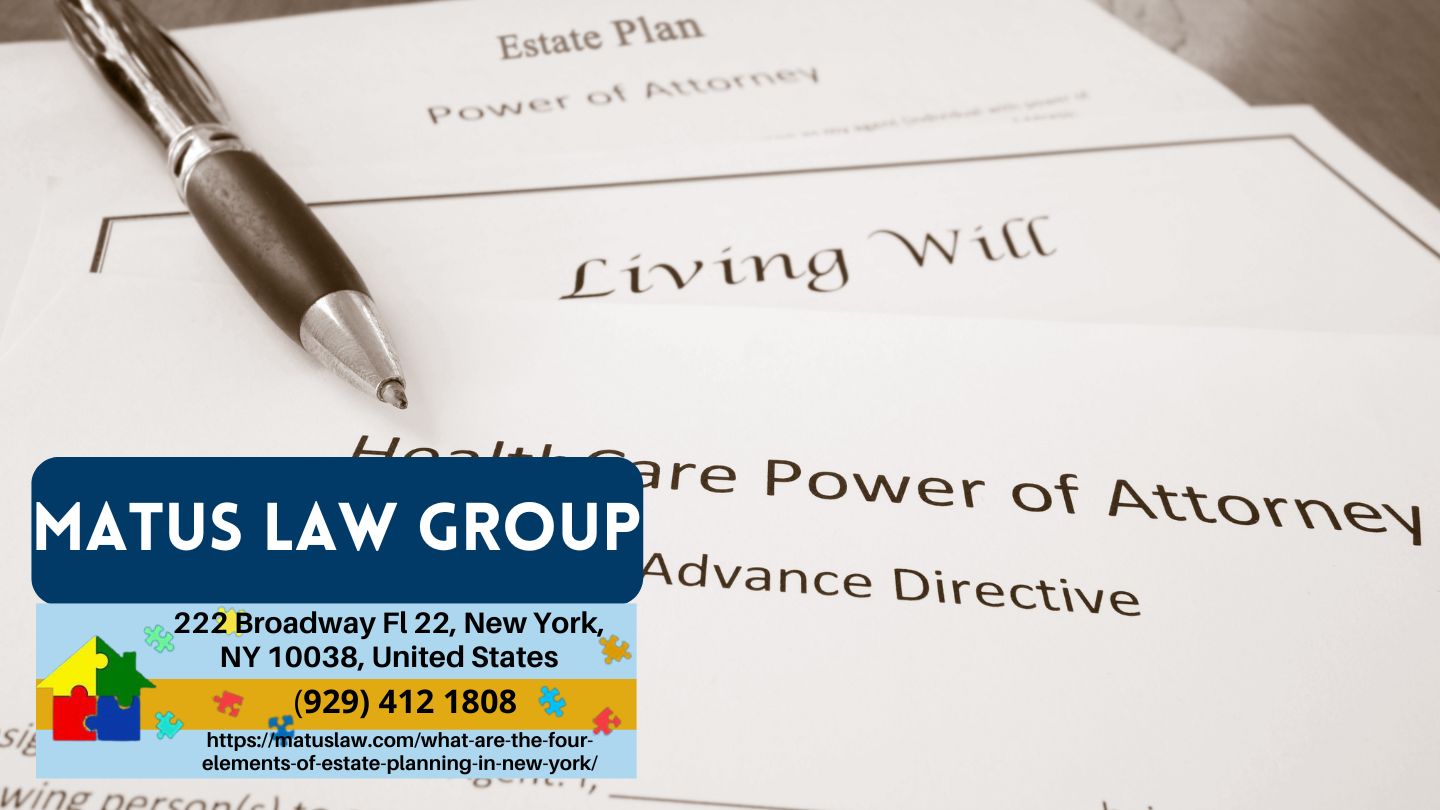Estate planning stands as a vital endeavor that transcends mere financial management; it’s a strategy that empowers individuals to secure their legacy and safeguard their loved ones’ futures. Navigating through the four elements of estate planning in New York demands a comprehensive grasp of local laws and an astute awareness of individual needs, ensuring a seamless transition of assets and wishes while minimizing potential complications.
If you find yourself facing the complexities of estate planning in New York, it’s crucial to partner with a knowledgeable professional who can guide you through every step of the process. With the help of Matus Law Group’s New York estate planning attorneys, you may be able to navigate the intricate process of legal requirements, taxation nuances, and familial considerations, ultimately achieving the peace of mind that comes with a thoughtfully crafted estate plan. Contact us today at (732) 281 -0060 to schedule a consultation.
Here are the four essential elements of estate planning in New York you’ll need to take care of:
1. Last Will And Testament
The last will and testament is usually shortened to the term “will.” It highlights what you envision for your assets after you pass and names the individuals to whom you assign these assets.
If you don’t leave a will, your assets will be administrated or probated according to their worth. When an estate is worth over $30,000, it’s probated according to New York laws. When an estate is worth under $30,000, there’s a “small estate proceeding” that decides how your assets will be administered.
A will enables your loved ones to avoid a painful probate process and receive the assets as you want.
It’s best to discuss your will with the trustworthy, close people in your life to avoid any potential problems after you pass. Estate planning experts believe that the optimum time for drawing up a will is during and after significant life milestones, such as getting married.
You must have a will when you have a child since it establishes the individuals who will take your child’s legal guardianship if both parents undergo an accident.
2. Healthcare Power Of Attorney
Your healthcare power of attorney (HPOA) is a legally binding document. Its purpose is to officially name the person who will make your healthcare decisions for you if you can’t make them yourself. It’s best to get it drawn up along with your will through a New York estate planning lawyer.
An HPOA is also known as a living will or advanced medical directive. If you’re terminally ill or incapacitated, your decision-maker will inform your medical provider about decisions pertaining to life support or intervention.
3. Financial Power of Attorney
Your financial power of attorney is a legally binding document that names the person you want making your financial decisions for you if you can’t make them yourself. If you’re medically incapacitated, it enables a trusted person to handle investments and bills.

4. Establish a Trust
A trust indicates how you want your beneficiaries to use your assets after you pass. It’s a legal entity that highlights stipulations. You can use it when you’re alive or after you pass to protect your assets from being improperly used.
Trusts are usually set up to provide a steady income for heirs and give older people routine care. You can also set up trusts for specific circumstances or expenditures.
You don’t need to have a trust unless your estate or insurance policy is sizeable. In that case, discuss it with an estate attorney to set the correct parameters.
Elements of a Trust
A Trust comprises five fundamental components: the grantor, assets, trustee, beneficiary, and terms. Here is an in-depth exploration of each element:
- Grantor: Also referred to as the trustor or settlor, the grantor is the originator of the Trust. This role can be assumed by an individual, a couple, a company, or an organization. To establish a Trust, the grantor must be at least 18 years old and possess sound mental faculties. The grantor can establish specific conditions and stipulations governing the management of the Trust and the distribution of assets after their passing.
- Assets: These encompass properties such as real estate, funds, stocks, vehicles, investment accounts, and any items of monetary value. In situations involving valuable possessions or items lacking formal ownership documentation, an inventory is compiled and submitted to the Trust. When dealing with digital assets like cryptocurrencies or social media accounts, the grantor can incorporate them into the Trust, designating a beneficiary and indicating the existence of a separate document containing access particulars.
- Trustee: This individual assumes the fiduciary duty of overseeing and managing the Trust, ensuring compliance with the grantor’s stipulations. The Trust legally owns the assets, and the trustee is responsible for fulfilling tax obligations, maintaining accurate financial records, and monitoring generated income. Prudent asset investment is a requirement for the trustee, prohibiting speculative ventures. The paramount concern is always the best interests of the beneficiary. Following the grantor’s demise, the trustee is tasked with distributing assets as instructed in the document.
- Beneficiary: The beneficiary is the designated individual(s), charitable entity, or organization entitled to receive Trust assets upon the grantor’s passing. This may also encompass minor children, necessitating specific provisions regarding the age and circumstances under which assets are transferred.
- Terms: The terms encapsulate the grantor’s intentions regarding Trust management. The versatility of a Trust lies in its ability to be tailored to the grantor’s and beneficiaries’ requirements. The grantor is obligated to clearly outline the conditions and directions that guide the trustee in distributing assets as desired.
| Element | Description | Purpose |
|---|---|---|
| Last Will And Testament | Specifies asset distribution and legal guardianship for minors in case of your passing. | Ensures proper asset allocation, avoids probate issues, and designates guardianship for children. |
| Healthcare Power Of Attorney | Appoints an individual to make healthcare decisions on your behalf if you’re unable to do so. | Ensures your medical preferences are upheld and eases decision-making during critical health situations. |
| Financial Power of Attorney | Authorizes someone to manage your financial affairs if you become incapable. | Allows a trusted person to handle financial matters in your best interest when you’re unable to do so. |
| Establish a Trust | Outlines asset distribution and usage instructions for beneficiaries after your passing. | Provides control over asset allocation, safeguards assets, and ensures specific purposes are met. |
New York Estate Planning For Your Peace Of Mind
Estate planning enables you to ensure that your possessions go to the people you care for. It’s imperative that you create a legalized, official plan that follows your plan and vision for asset distribution.
If you need an attorney for your estate planning needs, contact us today. Our New York estate planning lawyers are ready to answer any questions you may have.



